Several technological problems resulted in a muddled and late post last week. My apologies.
SPOTS AND RUBBISH
I have a navy cotton/linen blend dress with big white spots. It’s versatile and can be dressed up with strappy sandals and for a more casual occasion, worn with espadrilles. I’m telling you all this because I’ve just read in a decorating magazine that psychologist Dr Dion Terrelonge says we should avoid spots and polka dots as they can cause stress and a negative effect.
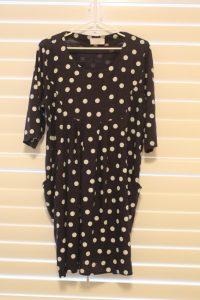

Instead we should opt for horizontal patterns. Apparently our eyes naturally scan horizontally so these designs echo patterns found in nature. Interestingly, the article acknowledge that spots and polka dots are big in fashion this year, but there’s no comment on how these patterns on clothing impact on our stress levels. I really like my navy and white dress and it will be out and about come spring. It will be worn frequently, unlike most pieces of clothing owned by Australian women, which are worn only seven times before being discarded.
Apparently, only 15% of clothing donated to op shops/thrift shops can be on sold. The rest goes overseas to developing countries or is sold by weight as rags. It all ends up as landfill. There’s lots of information online about effectively laundering clothes to keep them looking fresh, ways to invisibly and visibly mend everything, even zips, and reasons why we should all buy less and certainly less man made fibres.
Ahead of the annual Clean Up Australia Day, it has been revealed that beaches in Western Australia are the most littered in Australia. Although we have the least amount of plastics collected in the cleanup, we have the highest amount of other rubbish, mostly metal and glass. This results in 1100 tonnes of metal and glass going directly to landfill.


We pride ourselves on having one of the most beautiful coastlines in the World but the figures highlight the need for a different attitude towards caring for our beaches. The five most common pieces of rubbish are
1. cigarette buts
2. glass fragments
3. alcohol cans
4. alcohol bottles
5. bottle caps and lids
OTHER THINGS
I know you’re not supposed to play with your food but I like to paint mine before I eat it. My eyesight is not good so I’ve moved from botanical paintings to smaller, less detailed subjects.
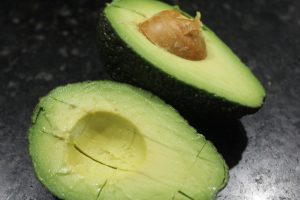

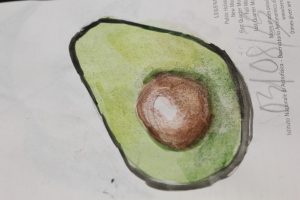

Small paintings every day in an old, unused Moleskin diary. Not really water colour paper, but small, quick paintings are very satisfying when life is so busy.
Currently reading Large Print books leading up to eye surgery. The first, which I’m really enjoying is Louise Penny’s All The Devils Are Here, set in Quebec and Paris involving a Canadian detective investigating his French Godfather’s attempted murder. Shakespeare said,’Hell is empty and all the Devils are here’. which indicates the many twists and turns throughout this story.
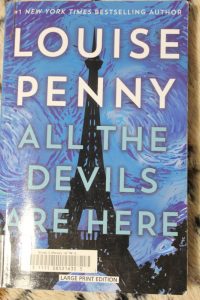

Winner of the Agatha Christie Award For The Best Mystery Novel of 2021 this is Perry’s 16th Chief Inspector Armand Gamache of the Sureté du Quebec series. I’ll be looking for more.


The other book is Claire Balding’s Walking Home, My Family and Other Ramblings. Balding is a well known horse race commentator in the UK and is also an award winning British radio announcer known for her commentaries from the Olympic Games. She’s prolific author. This book details her ‘rambles’ around the UK all recorded and broadcast on radio. She is eloquently describes the beauty of each of her walks while interviewing people of interest. Apparently, the broadcasts, called “Ramblings” are very popular.
As usual, both books are borrowed from the library.
A BATTERY ANOMALY
Last week a group of protesters gathered outside Western Australia’s Parliament House to protest about logging in native forests. All logging is banned in Western Australia’s native forests by 2024. WA already imports 80% of timber required.
Apparently, according to Green MLA Brad Pettitt, ‘The main issue in WA is the mining practices which would still be allowed in the forests after logging stops.”
Here’s the ANOMALY
To supply the quantities of lithium, copper, nickel etc required for electric car batteries and storage batteries will need more of all these metals in mineable deposits than is known to exist. These batteries are known to last for less than 10 years. Then those chemicals will need to be replaced with freshly mined chemicals as there is no effective method of recycling them at this time. They will become landfill.
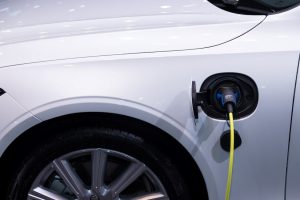

Image Pexels
So we are saving the Planet by hugely increasing mining which is said to be destroying the environment with no end in sight. We must also ignore the well established but inconvenient fact the electric cars require six times more energy to manufacture than ordinary cars and that their manufacture produces much more CO2.
It is a dilemma which makes me think of the children’s story,’ The Emperors New Clothes’
